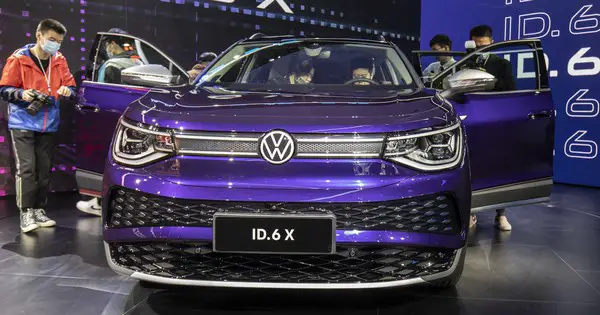VW, Hyundai, Ford, Nissan Must Reduce Production
Trung Quốc, the largest automobile market in the world, has been a major hub for international car brands for many years. However, these brands are now facing the risk of being overtaken by domestic Chinese brands. The market share of Chinese cars has risen from 40% in 2015 to 57% in 2023, leaving little room for international brands to regain their lost market share.
Shift to Electric Cars
The rapid transition to electric cars in the Chinese market has led to the rise of affordable domestic car brands that offer good quality. On the other hand, international brands are struggling to catch up. Some major international brands have even been forced to withdraw from the market. Stellantis, the multinational automotive corporation formed by the merger of FCA and PSA, sold off its assets and withdrew Citroen and Peugeot from China in 2023. Prior to that, their Jeep brand had also exited the market. Another international brand, Renault, left China in 2020.
The remaining major players in China’s automobile market are also facing challenges. General Motors (GM), the second-largest international automotive company in China, has seen its market share drop from 14% to 7% between 2017 and now. GM, which used to make billions of dollars in revenue from China every year, is now accepting losses and considering a retreat, according to CEO Mary Barra.
The Struggles of Ford in China
Ford, in particular, is facing even more dire circumstances in China. According to Bloomberg, their Chinese plant is operating at less than 20% capacity due to low demand.
Stellantis, GM, and Ford all made the mistake of assuming they would always have an advantage over domestic brands and that Chinese consumers would always prioritize foreign cars. They did not anticipate the rapid transition to electric cars, which has led to their swift decline in the market.
Japanese Brands also in Trouble
Japanese car brands are also facing difficulties in the Chinese market. Nissan CEO Makoto Uchida recently stated that the rise of domestic Chinese car brands has completely disrupted the market. Intense price competition has pushed car prices lower than Nissan had anticipated, resulting in a 2-year setback for the company.
Volkswagen and Hyundai’s Challenges
Volkswagen and Hyundai are also experiencing similar challenges as GM and Nissan, with their plants operating at less than half capacity. Volkswagen, once the number one brand in China, was overtaken by BYD in 2023 and is unlikely to regain its position without further setbacks. Volkswagen’s profits in China in 2023 were 2.6 billion euros, which is predicted to drop to 1.5-2 billion euros in 2024. International brands are struggling to compete with BYD, which has recently lowered its prices by 5-20%.
Success Stories: Toyota and Tesla
In the mass-market segment, Toyota and Tesla are going against the trend in China. Toyota’s market share has increased from 4% to 6% thanks to its regular engine cars. Tesla, meanwhile, has captured a 3% market share in China, on par with Nissan.
In the luxury segment, renowned brands such as BMW, Mercedes-Benz, and Audi still dominate the Chinese market. Chinese consumers do not have a large domestic luxury brand to rival them. The only potential competitor is Hongqi, which produces around 200,000 cars annually, one-third of the production capacity of BMW/Audi/Mercedes.
Conclusion
The challenges faced by international car brands in China are significant. The rapid shift to electric cars and the rise of domestic Chinese brands have pushed these brands to reduce production and accept losses in the Chinese market. However, there are still success stories for brands like Toyota and Tesla, who have managed to thrive in this evolving market.
To learn more about the latest news and updates in the business world, visit Business Today.

